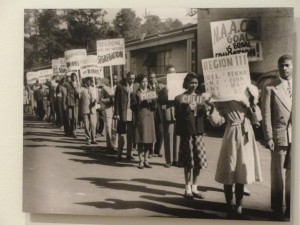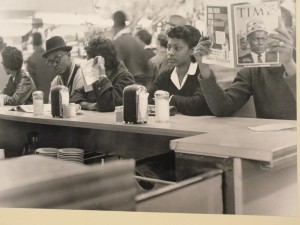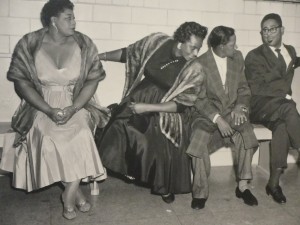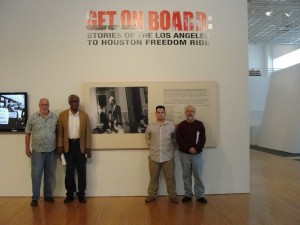TSU University Museum honors the Freedom Riders
HOUSTON – The Houston Peace Council branch visited an outstanding art exhibition at the Texas Southern University University Museum on 1/15/12 (Martin Luther King, Jr.’s birthday) entitled “Get on Board: Stories of the Los Angeles to Houston Freedom Ride.†Our group was diverse and included women and men who were African American, Latino and Anglo. Three of the participants were veterans to include one Iraq War veteran.
The exhibit was breathtaking both in its content and presentation. There was a replica of the lunch counter which was integrated in Houston in 1961 at the Weingarten’s store on Almeda near the Texas Southern University campus. There was also a replica of a burned out bus and a prison cell with corresponding videos which were instructional.
The exhibition was organized by the University Museum and the School of Communications at Texas Southern University. Community partners include: The Houston Peace and Justice Center, Think Peace International, the Ebony Opera Guild, The Volunteer Circle, the Museum of Fine Arts, Houston, and 3 sisters in the spirit Theatre Ministry.
From the Exhibition Overview:
“Get on Board: Stories of the Los Angeles to Houston Freedom Ride shares the seldom heard story of the Congress of Racial Equality (CORE) sponsored Freedom Ride from Los Angeles, California to Houston, Texas. On August 9, 1961, a number of Los Angeles students boarded a train headed to Houston.â€
These students included many communists and socialists and were primarily Anglo. Anglo students were targeted by the racists and received the most brutal treatment. When jailed, Anglos and African Americans were segregated.
The overview continues:
“The group’s assignment was to aid members of the Houston Progressive Youth Association (PYA) to nonviolently desegregate Houston’s Union Station Coffee Shop. The group would then proceed to Jackson, Mississippi to join the scores of other Freedom Riders converging on the city to nonviolently protest racially segregated public travel facilities throughout the American South.
Instead, these California Freedom Riders were arrested for unlawful assembly while trying to desegregate Houston’s Union Station coffee shop with PYA members and Texas Southern University students … The story of their journey, arrest, brutal treatment in jail, and subsequent court trial is an important chapter in the unique civil rights history of Texas and places it within the pantheon of events key to the struggle for racial equality in the United States.
The Get on Board exhibition also recounts the experiences of many other Californians that joined the Freedom Rides of 1961. It reveals the stories of Robert Singleton, Ph.D., now an economics professor at Loyola Marymount University in Los Angeles and his wife, Helen Singleton, then a 29 year-old freshman at Santa Monica City College, who took 12 volunteers with them from California to participate in a Freedom Ride to Jackson, MS, during the summer of 1961. Both were convicted of “breach of peace†and sentenced to hard labor in the Mississippi State Penitentiary, known as Parchman Farm for attempting to desegregate the public interstate travel facilities in Jackson.
John Dolan, a student at the University of California Berkeley, was disinherited by his father, arrested in Hinds County, MS and beaten by police in New Orleans, LA for participating in the Freedom Rides. The personal sacrifices and brutality inflicted upon Dolan and his fellow nonviolent Freedom Riders stirred the consciousness of America. These images prompted President John F. Kennedy’s administration to provide protection for the Freedom Riders and to pressure the Southern states to enforce the U.S. Supreme Court’s two decisions mandating the desegregation of public interstate travel facilities.
A complete history of the 1961 CORE sponsored Freedom Rides is explored in Get on Board. The exhibition recounts the ascendance and determination of the student movement. It examines how the Freedom Rides transformed and bolstered the Civil Rights Movement in America with its strategy of ‘nonviolent direct action protest.’ More than 100 compelling photographic images are featured within the exhibition to vividly depict the social, political and moral strivings of the 1961 Freedom Rides. The exhibition utilizes evocative oral histories, music from the Civil Rights Movement, rare historical artifacts and documents to recount this captivating story. Recreations of a section of the Birmingham, AL bus terminal, a Parchman Farm prison cell and the lunch counter of the Houston Union Station Coffee Shop, help to bring this dynamic history to life.
Over 400 individuals participated in the 1961 Freedom Rides. Get on Board: Stories of the Los Angeles to Houston Freedom Ride commemorates the 50th anniversary of the 1961 Freedom Rides. It celebrates the courage and optimism that inspired these American heroes, both black and white to leave their schools, families and homes to secure the promise of freedom and liberty for all Americans.â€
On January 20th, a forum sponsored by community leaders David Atwood of the Houston Peace and Justice Center and PK McCary of Think Peace International will include dialogue with activists, scholars and students addressing the impact of the Freedom Rides and other Civil Rights events on current and future movements.



